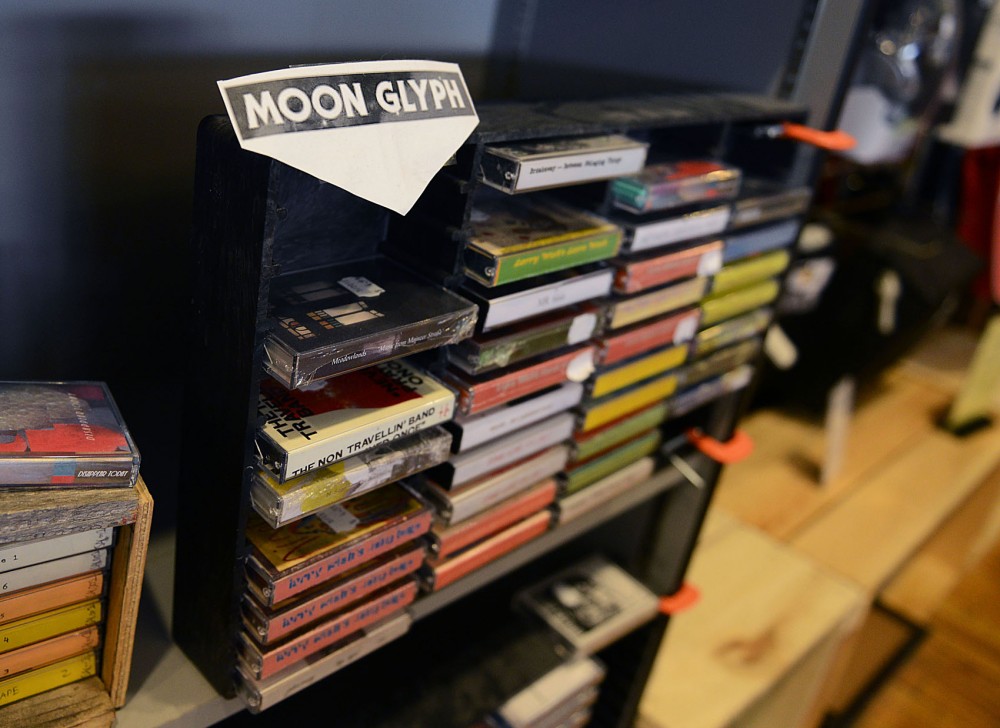Steve Rosborough remembers the day he bought his first cassette.
It was post-Y2K, long after cassettes went out of vogue, but many of the bands Rosborough listened to at the time were fiercely independent and utilized cassettes as a cost-effective measure.
“The very first cassette I bought was [by] Sunburned Hand of the Man. … They had a cassette called ‘The Pegadrift,’” Rosborough said. “I had to find a tape deck to actually get to listen to it.”
Despite the legwork involved, Rosborough was immediately hooked on the physicality and the cachet of cassettes, which proved to be a pivotal moment.
He’s now the proprietor of Moon Glyph, a cassette-heavy record label he founded in Minneapolis in 2009.
Rosborough had moved to Minnesota after college and pulled a stint at Electric Fetus before starting Moon Glyph, which began as cassette-only but branched out into vinyl after reaching a demand threshold for just tapes.
The label is now based in Oakland, Calif., after he left Minneapolis in 2012 — a move that came with no harsh feelings.
Rosborough, a lifelong Midwesterner, desired a new home base for his small, sprawling label.
As for a Moon Glyph style, Rosborough stressed that there’s not a distinctly defined sound to encompass all the label’s bands.
“I like to keep the aesthetic and the sonic quality of the label really open,” Rosborough said. “I don’t think nowadays — with the Internet and the proliferation of music — people listen to one style of music very often.”
Were Rosborough forced to compartmentalize Moon Glyph’s roster, he’d brand it psychedelia.
“I like music that transports you or takes you to a space,” Rosborough said. “That’s one of the only [criteria] I have — it needs to be compelling in its own way.”
Rosborough has music blogs to thank for the dissemination of Moon Glyph’s music. Label golden child Buffalo Moon’s debut album, “Wetsuit,” was mentioned by blog trendsetters Gorilla vs. Bear.
However, it was mostly smaller sites that sped up Moon Glyph’s momentum in the beginning; many of Rosborough’s friends relentlessly promoted the label’s artists through their pet writing projects, slowly propelling it to become a cult favorite in the underground music world.
But ultimately, it was music mega-blog Pitchfork that propelled Moon Glyph to the next level.
“Pitchfork decided, ‘We’ve got to get in on this blog stuff,’” Rosborough said. “‘Instead of covering what Gorilla vs. Bear does, let’s bring together this underground movement that we’re perceiving.’”
This led to the genesis of the short-lived blog aggregate Altered Zones, which initially launched as a Pitchfork spinoff that focused on smaller-scale artists.
“Moon Glyph did pretty good on Altered Zones; they gave the time of day to a lot of our releases,” Rosborough said.
What made Moon Glyph stand apart was its ability to cull under-the-radar musical talent from around the world while other labels were dedicated more to the local end of things. In recent years, Rosborough has expanded his label well beyond Minnesota.
“I still work with a ton of people from the area because they can make amazing music. But nowadays, I have a bunch of European artists, people from all across the U.S.,” he said.
“Geographically, there’re no bounds. This is the Internet age, and there [are] a lot of people I’ve never had the opportunity to meet in person.”
Continental confines aren’t the only ones Rosborough seeks to break. Moon Glyph’s 1970s-inspired psychedelic synth band, Leisure Birds, will co-release its next album, “Tetrahedron,” later this month with Minneapolis powerhouse Totally Gross National Product.
Collaboration between record labels is all but unheard of, but according to Rosborough, it makes perfect sense.
“It’s great for me, and it’s great for them,” he said. “We can all do a little more than we can on our own.”
Financial pragmatism aside, the collaboration is also fitting because Leisure Birds’ first LP was released on TGNP, and Moon Glyph released their second.
Though Moon Glyph is coasting on the sweet winds of independent success, Rosborough still has to work regular jobs as a freelance graphic designer to hold down the fort. Because of the inherent financial difficulties of running an independent label, Rosborough is intent on keeping Moon Glyph a one-man endeavor that lives within its means.
“There’s hardly enough for the label, so I wouldn’t be able to pay somebody what their time would be worth, unfortunately,” he said.
This overwhelming feeling has led Rosborough to fleetingly consider throwing in the towel at times. But his optimistic realism, gratefulness toward Moon Glyph supporters and the reward of bolstering bands he loves make the hard-knock realities of running a boutique label worth facing.
“It’s important that I don’t quit and I don’t let myself become frustrated or cynical by the way the industry works,” he said, “and by the fact that music is not a great place to make a buck for anybody.”














